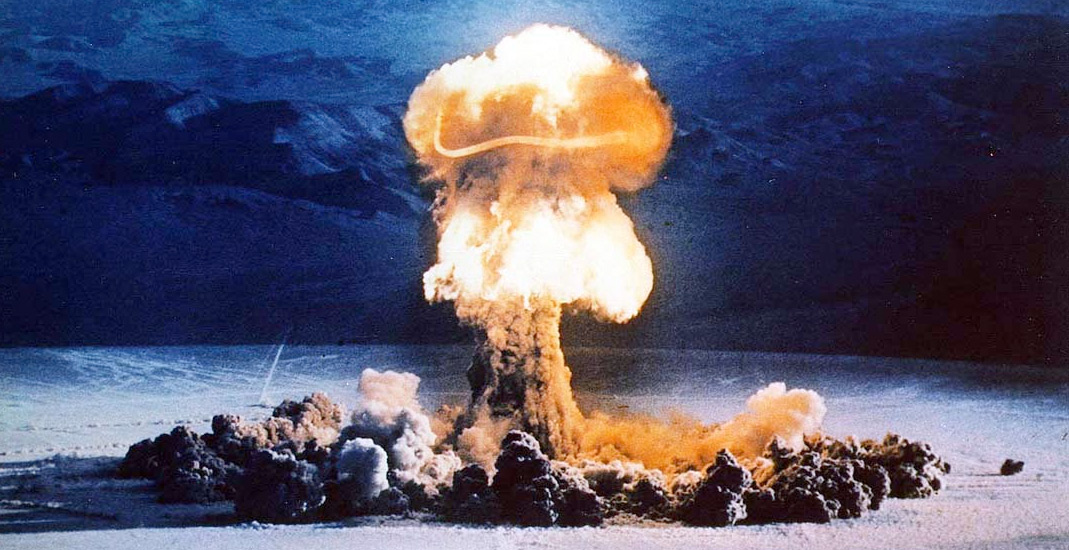By Sylvia Schwarz, MinnPost, 7 October 2009
We’ve heard a lot recently about the evil of Iran and its government, about President Mahmoud Ahmadinejad’s denial of the Holocaust, about how he stole the election, and about the grave threat to the world his nuclear facilities are. In July 2007 Shimon Peres, Israel’s president, said Ahmadinejad “worship[s] the bomb more than he’s worshipping God in heaven.” This statement may have helped to whip up opinion among fundamentalists of all religions against Iran’s nuclear ambitions, but it did little to allay skeptics’ questions about the real nuclear threat in the Middle East.
Since the beginning of Iran’s nuclear program, Iran has been a signatory to the Nuclear Non-Proliferation Treaty. Israel has not. Iran has allowed International Atomic Energy Agency (IAEA) inspectors into its facilities and complied with all the requirements of the IAEA. Israel has not. In fact, Israel’s nuclear weapons are still a “secret.” Mordechai Vanunu, an Israeli nuclear technician, spent 18 years in prison there after revealing aspects of the secret program to the British press.
By all accounts, Iran perhaps could produce one nuclear bomb per year, and might have one now, which is untested. According to Seymour Hersch in “The Samson Option,” Israel already owns more than 200 nuclear weapons, and since that book was published in 1993 Israel certainly has produced more.
Examine the record first
But isn’t it the case that with a loose cannon like Ahmadinejad in power in Iran, there can be no security if Iran has the technology to create any nuclear weapons? There are a lot of loose cannons out there, and there is no doubt that Ahmadinejad is, speaking generously, not well educated about world history. But we should examine the record before accusing him of attempting to sacrifice the Iranian people to nuclear war. Iran has never attacked the United States, Israel, or any European or Arab country.
It is true that Iranian students, with the go-ahead from the government at the time, took American embassy workers hostage for more than a year. And it is possible, though he disputes the claim, that Ahmadinejad was one of those students. Israel has not been so restrained, attacking all surrounding Arab countries in the 1967 Six-Day War, and in what should offend Americans to this day, bombing the USS Liberty, killing 34 American sailors and wounding 171. Since the Six-Day War Israel has attacked Iraq’s nuclear facility (1981), Syria’s nuclear facility (2007), and Lebanon (1982 and 2006), and kept up a brutal campaign of occupation and ethnic cleansing against the Palestinians.
Iran has no freedom of the press, closes down media outlets and persecutes journalists. Israel is known for its free press, yet it also clamps down on dissent. This year Israel confiscated computers and harassed members of New Profile, a peace group in Israel. Israel would not allow any foreign journalists into Gaza before or during its assault there in December, just as it barred journalists into Jenin in 2002 during what human-rights workers and Palestinians called a massacre.
Israel: A democracy for some
Iran recently had a disputed election and is not by any means a democracy. Israel is repeatedly called the only democracy in the Middle East. But its Basic Laws (Israel has no constitution) deny non-Jews many of the rights that Jews alone enjoy, including the right to automatic citizenship at birth, the right to marry and live with one’s choice of mate, and the right to own property. Israel is a democracy for Jews alone, not for all citizens.
Iran has no chance of nuclear parity with Israel. Iran, a huge country to the east of tiny Israel, could never launch a first strike, with Israel’s far superior weaponry and world opinion. Israel, on the other hand, could very easily launch a nuclear strike against Iran, wiping it off the map, and knowing that since the wind blows from west to east, the fallout would be well diluted before it made its way back to Tel Aviv. Given Israel’s history with world opinion, there would be no fallout on that stage either. Iran rightly believes that Israel poses an existential threat to Iran, not the other way around.
Since Iran could never expect protection from the world, it feels it should be allowed to protect itself from Israel.
Sylvia Schwarz, a resident of St. Paul, is a member of the Coalition for Palestinian Rights (CPR) and the International Jewish Anti-Zionist Network, Twin Cities (IJAN-TC).

